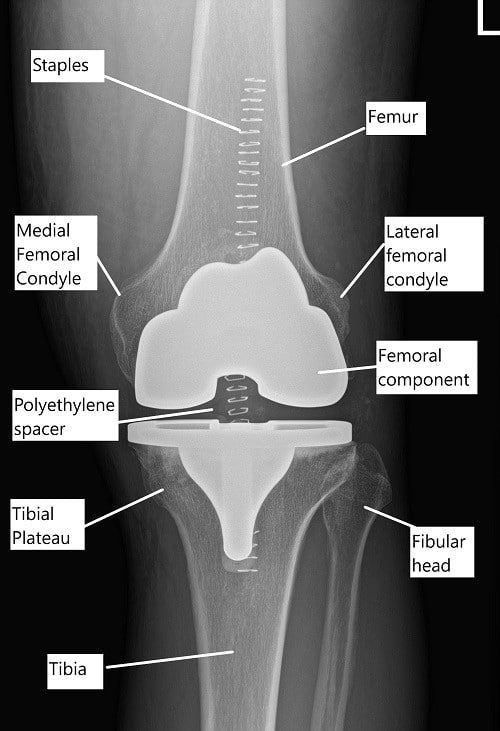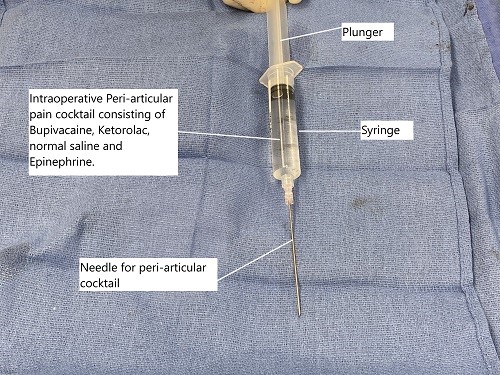Outpatient Knee Replacement
Knee pain is a common problem for many people. Severe pain or discomfort that affects daily activities or comes with swelling, redness, or warmth should be evaluated by a healthcare provider.
At Complete Orthopedics, our specialized team is equipped to handle all types of knee pain, offering surgical treatments when necessary. We serve New York City and Long Island with six hospital locations, providing excellent surgical and orthopedic care. You can schedule an appointment with our expert surgeons online or by phone.
Discover the common causes of knee pain and explore the treatment options we provide, including when surgery might be required.
Overview
Outpatient knee replacement means the patient can go home the same day of the surgery. Traditionally patients without any complication may stay in the hospital for up to 3 days after the surgery.
The outpatient knee replacement is made possible with a multidisciplinary team that works to ensure patient safety. While outpatient knee replacement surgery offers several advantages, outpatient surgery is not suited for all patients.
Knee replacement surgeries are being performed in more and more numbers owing to the success and advancement of arthroplasty technology. The surgery is performed when all nonsurgical methods of treatment have failed to help patients with knee arthritis.

Postoperative X-ray showing a total knee replacement.
Besides the elderly, a large number of young patients are undergoing knee replacement surgery. An increased number of patients no longer delay replacement surgery as they demand a lifestyle free of pain and deformity. With the advent of newer knee implants and techniques, knee replacement surgeries today last for 20 years or more.
Outpatient knee replacement has been made possible due to a better understanding of the risks associated with knee replacement surgery and its management. The orthopedic physicians today work with pain management specialists and anesthesiologists to better predict and manage the pain after the surgery.
The introduction of medications such as Tranexamic acid has reduced the amount of bleeding occurring during and after the surgery. The operative practices and the techniques in knee replacement have reduced the chances of prosthetic joint infection to a minimum.
However not all patients are candidates for an outpatient knee replacement surgery and the patients are offered an outpatient surgery only after careful assessment by the surgeon, anesthesiologist, pain specialist, nurses, and therapists.
- Ideal outpatient knee replacement candidates have a strong social support system at their homes. Patients may often need help moving about at home and to help them deal with any potential complications.
- Patients need to be strongly motivated for outpatient knee replacement surgery. A strongly motivated patient is able to follow the at-home instructions and may tolerate the at-home care better than others.
- Ideal patients are aged less than 70 years and are free from any major medical illnesses such as heart or lung disease, vascular disease, or any neurological disease. Patients with any heart disease such as coronary artery disease or COPD are at an increased risk of complications following the surgery.
- Patients who are current smokers, who abuse alcohol, illicit drug users, or with a history of use of opioid analgesics are poor candidates for outpatient knee replacement surgery. Such patients may have an unpredictable pain response after the surgery and are better managed by in-hospital stay after the surgery.
- The housing of the patient should have a safe environment for immediate postoperative rehabilitation. Ideally, the patients living quarters should be on the same floor along with the bathroom and kitchen. Safe housing is important to prevent any falls after the surgery.
- Patients with a history of depression/anxiety are not ideal candidates for outpatient knee replacement surgery.
- Obese patients with a BMI of more than 30 may not be advised outpatient surgery.
Benefits of Outpatient Knee Replacement
Several benefits are associated with outpatient knee replacement:
Faster Recovery: Patients can start their recovery in the comfort of their own home, which can lead to a quicker return to normal activities.
Lower Risk of Infection: Spending less time in the hospital reduces the risk of hospital-acquired infections.
Cost-Effective: Outpatient procedures can be more cost-effective for both patients and healthcare providers due to the reduced need for hospital resources.
Patient Satisfaction: Many patients prefer recovering at home, which can enhance their overall satisfaction and comfort.
Outpatient knee replacement surgery offers several advantages for the right candidates. The outpatient surgery can minimize the risk of the postoperative surgical site/wound infection. In a hospital setting, the patient may potentially be vulnerable to catch a resistant infection from another patient or a healthcare provider.
The patients report greater satisfaction while being at home after surgery. The home environment is reassuring to the patient and the movement in a familiar environment promotes an early return to activities. The patients also report greater participation in therapy and exercises in the comfort of their own homes.
The outpatient surgeries are also associated with a decrease in the cost of the procedure and reduce the burden on the healthcare system while not compromising with the care of the patient. The patients are constantly monitored after the surgery and are allowed to walk with support the same day.

Intraoperative cocktail for peri-articular injection used for pain control after the surgery.
The patients are thoroughly instructed before they can sit in a car to go home. At home, a trained nurse and a therapist monitor the patient’s progress. At any step should the need arise, the patient may be admitted to the hospital. The nurse constantly takes care of the operative dressing.
Some patients may not feel comfortable going home the same day of the surgery and they are supported in their decision to stay at the hospital. Hospital stay offers the patient the advantage of constant monitoring and the ability to manage any complications should they arise.
With the success of knee replacement surgeries, a large number of young patients may today opt for an outpatient knee replacement surgery that may be performed in a hospital or an ambulatory surgical center. Speak with your surgeon regarding the best options should you require knee replacement surgery.
How is Outpatient Knee Replacement Performed?
The procedure for outpatient knee replacement is similar to traditional knee replacement but with a few key differences to facilitate a quicker discharge. Here’s an overview of the process:
Preoperative Preparation: Patients undergo thorough preoperative assessments to ensure they are suitable candidates for outpatient surgery. This includes evaluating their overall health, home environment, and support system.
Anesthesia: Regional anesthesia, such as a spinal or epidural block, is commonly used to minimize pain and reduce the need for general anesthesia, which can prolong recovery.
Surgical Technique: The surgeon performs the knee replacement using minimally invasive techniques, which involve smaller incisions and less tissue damage. This approach helps reduce pain and speed up recovery.
Postoperative Care: After the surgery, patients are closely monitored in a recovery area. Pain management is a priority, and patients are encouraged to start moving their knee as soon as possible.
Discharge: Once the patient meets specific criteria, such as stable vital signs, adequate pain control, and the ability to walk with assistance, they are discharged home with detailed instructions for home care and follow-up appointments.
Recovery
Recovery from outpatient knee replacement involves several stages, and it’s important to follow your surgeon’s instructions closely. Here’s what you can generally expect:
First Few Days: The initial days after surgery are crucial for pain management and preventing complications. Patients are advised to take prescribed pain medications, keep the surgical area clean and dry, and start gentle movements to avoid stiffness.
Physical Therapy: Early physical therapy is essential for regaining mobility and strength. A physical therapist will guide you through exercises to improve knee function and flexibility.
Follow-Up Appointments: Regular follow-up visits with your surgeon are necessary to monitor your progress and address any concerns. These appointments help ensure that your knee is healing correctly.
Resuming Activities: Most patients can return to light activities within a few weeks, but it may take several months to fully recover and resume more strenuous activities. Your surgeon and physical therapist will provide guidance on when it’s safe to return to work, sports, and other activities.
Conclusion
Outpatient knee replacement is a promising option for many patients suffering from severe knee pain and disability. With the potential for faster recovery, lower infection risk, and cost savings, it offers a viable alternative to traditional inpatient surgery. However, it’s important to carefully consider your individual circumstances and consult with your healthcare provider to determine if this approach is right for you. By understanding the process, benefits, and what to expect during recovery, you can make an informed decision and take an active role in your knee health journey.
Do you have more questions?
How do I know if I’m a good candidate for outpatient knee replacement?
A thorough evaluation by your surgeon will determine your suitability. This includes assessing your overall health, medical history, support system at home, and motivation to follow postoperative care instructions.
How long does the outpatient knee replacement surgery take?
The surgery itself usually takes about 1 to 2 hours, but you will spend additional time in the recovery area to ensure you are stable before going home.
What should I do to prepare my home for recovery after outpatient knee replacement?
Prepare your home by arranging a comfortable recovery area, removing tripping hazards, stocking up on groceries and medications, and ensuring you have easy access to essentials like the bathroom and kitchen.
Will I need someone to stay with me after the surgery?
Yes, it’s important to have someone stay with you for at least the first 24 to 48 hours after surgery to assist with daily activities and ensure your safety.
How will pain be managed after outpatient knee replacement?
Pain is managed through a combination of medications, including opioids, anti-inflammatories, and local anesthetics. Your surgeon will provide a detailed pain management plan tailored to your needs.
What are the potential risks and complications of outpatient knee replacement?
Risks include infection, blood clots, implant issues, and complications related to anesthesia. Your surgeon will discuss these risks with you and take steps to minimize them.
How soon can I start physical therapy after surgery?
Physical therapy typically begins the same day or the day after surgery. Early mobilization is crucial for a successful recovery.
When can I expect to return to work after outpatient knee replacement?
This depends on the nature of your job. Many patients can return to light, sedentary work within 2 to 4 weeks. More physically demanding jobs may require 6 to 12 weeks of recovery.
What kind of follow-up care will I need after the surgery?
Follow-up care includes regular visits to your surgeon to monitor healing, physical therapy sessions, and possibly additional imaging studies to ensure the implant is functioning properly.
Can both knees be replaced at the same time in an outpatient setting?
Bilateral knee replacement (both knees) is typically not done on an outpatient basis due to the increased complexity and longer recovery period required.
What should I do if I experience severe pain or complications at home?
If you experience severe pain, excessive swelling, redness, or other concerning symptoms, contact your surgeon immediately. In an emergency, seek medical attention right away.
How long will I need to use assistive devices like crutches or a walker?
Most patients use assistive devices for a few weeks after surgery. The exact duration will depend on your progress and your physical therapist’s recommendations.
Will I need to make any dietary changes after the surgery?
While there are no specific dietary restrictions, maintaining a balanced diet rich in protein, vitamins, and minerals can support healing. Staying hydrated is also important.
Are there any activities I should avoid during recovery?
Avoid high-impact activities and movements that strain your knee, such as running, jumping, and heavy lifting, until your surgeon gives you the green light.
How will outpatient knee replacement affect my daily routine in the long term?
Most patients can return to their normal daily routine with improved mobility and reduced pain. Long-term restrictions are minimal, but high-impact activities may be discouraged.
What is the success rate of outpatient knee replacement?
The success rate is high, with most patients experiencing significant pain relief and improved function. Complication rates are low when proper protocols are followed.
Can I travel after my outpatient knee replacement surgery?
Travel is generally discouraged in the initial weeks post-surgery due to the risk of blood clots and the need for regular follow-up care. Consult your surgeon for specific advice.
How can I reduce the risk of blood clots after surgery?
Your surgeon may prescribe blood thinners, and you’ll be encouraged to move around and do gentle exercises to improve circulation. Wearing compression stockings can also help.
What role does my family or caregiver play in my recovery?
Your family or caregiver can assist with daily tasks, help you with exercises, monitor your condition, and provide emotional support throughout your recovery.
Will I need to make modifications to my car for driving after surgery?
You should not drive until your surgeon clears you, typically a few weeks post-surgery. No specific car modifications are usually needed, but ease of getting in and out of the car should be considered.
Are there any special exercises I should do before the surgery to prepare?
Preoperative exercises, often called “prehab,” can strengthen your muscles and improve your overall fitness, which may aid in a smoother recovery. Your surgeon or physical therapist can provide specific exercises.
How will outpatient knee replacement impact my sleep?
Initially, you may experience some discomfort that can affect sleep. Using pillows to support your knee and following your pain management plan can help improve sleep quality.
What advancements have made outpatient knee replacement possible?
Advances in surgical techniques, anesthesia, pain management, and postoperative care have all contributed to making outpatient knee replacement a viable and safe option.
How do I maintain the results of my knee replacement long term?
Maintaining a healthy weight, staying active with low-impact exercises, following your physical therapy program, and attending regular check-ups with your surgeon will help preserve the benefits of your knee replacement
My name is Dr. Suhirad Khokhar, and am an orthopaedic surgeon. I completed my MBBS (Bachelor of Medicine & Bachelor of Surgery) at Govt. Medical College, Patiala, India.
I specialize in musculoskeletal disorders and their management, and have personally approved of and written this content.
My profile page has all of my educational information, work experience, and all the pages on this site that I've contributed to.

